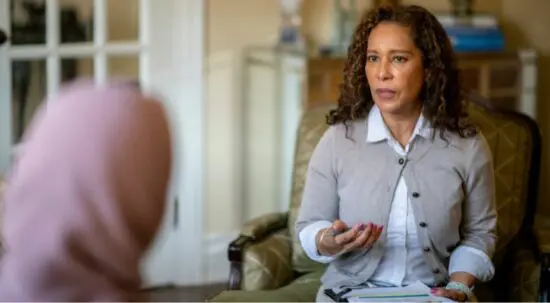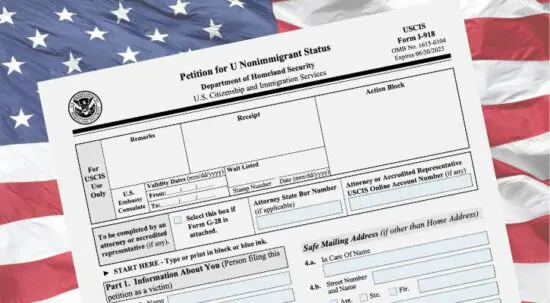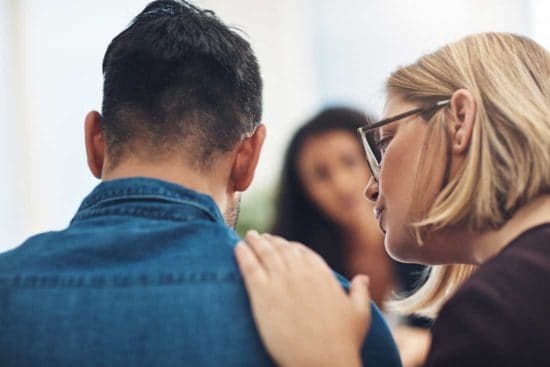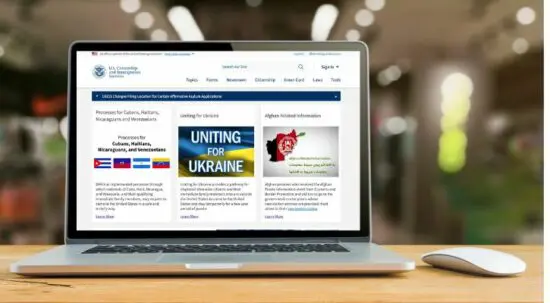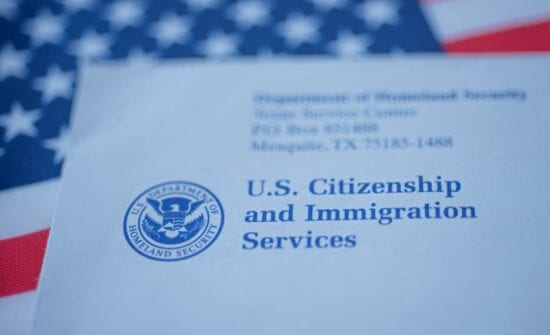Kisa VAWA ye?
Pwogram imigrasyon Lwa sou Vyolans kont Fanm (Violence Against Women Act, VAWA) nan se pou imigran ki sibi abi nan men yon manm fanmi yo ki se yon sitwayen ameriken oswa rezidan pèmanan legal (Lawful Permanent Resident, LPR). Abi ak vyolans domestik se aksyon ki vize blese ak kontwole yon moun nan yon relasyon entim.
Pafwa moun rete nan sitiyasyon danjere paske estati imigrasyon yo depann de manm fanmi yo. Yo rele VAWA yon “otopetisyon” paske li ba w yon fason pou w ajiste sitiyasyon w san èd oswa koperasyon moun k ap fè abizè w la pou w depoze yon petisyon pou estati imigran pou ou.
Si yo apwouve VAWA ou a, yo gen pou akòde ou yon aksyon difere epi w ap vin kalifye pou aplike pou w vin yon rezidan pèmanan legal ak yon Kat Vèt. Aksyon difere vle di ou ka viv ak travay nan peyi Etazini.
Si yo apwouve petisyon VAWA ou a ou kapab:
- Viv ak travay nan peyi Etazini legalman
- Aplike pou yon Kat Vèt
- Resevwa avantaj piblik yo (si ou se konjwen oswa pitit yon abizè)
| VAWA toujou disponib anba gouvènman ameriken aktyèl la. Ou ka aplike pou VAWA epi kontinye resevwa benefis VAWA. Si w gen kesyon, pale ak yon avoka imigrasyon. |
Ki moun ki ka aplike?
Ni gason ni fi ka aplike pou VAWA. Ou pa oblije gen estati imigrasyon ki legal. Li se pou sivivan vyolans domestik.
Ou ka aplike pou yon oto-petisyon VAWA si:
- Paran, konjwen, ansyen konjwen ou, oswa yon timoun adilt te abize.
- Paran abizif ou a se yon sitwayen ameriken oswa yon rezidan pèmanan legal.
- Ou ap viv avèk oswa ou te viv avèk paran abizif ou a.
- Ou gen bon karaktè moral.
Ou dwe pwouve abi ou te sibi a se te yon vyolans fizik oswa mechanste ekstrèm pou kalifye pou Lwa sou Vyolans Kont Fanm (VAWA). Sa gen ladan:
- Menas vyolans
- Abi fizik ak abi emosyonèl
- Vyòl ak abi seksyèl
- Kontwòl finansyè
- Detansyon fòse
- Pwostitisyon ak travay fòse
Si ou aktyèlman ap viv andeyò Etazini, ou dwe montre tou yo te abize ou nan peyi Etazini oswa paran abizif ou a ap travay pou gouvènman Etazini oswa pou fòs lame a.
Kòman Mwen ka aplike?
Ou ka aplike pou VAWA atravè U.S. Citizenship and Immigration Services (USCIS). Li p ap koute ou anyen pou aplike. Ou pral bezwen:
- Ranpli Fòm I-360.
- Bay prèv ou genyen yon relasyon ki kalifye avèk moun ki fè abi a.
- Bay prèv sitwayènte ameriken oswa estati rezidan pèmanan legal moun ki fè abi a.
- Bay prèv yo te abize ou gravman.
- Mete yon deklarasyon pèsonèl konsènan eksperyans ou.
- Bay prèv bon karaktè moral.
W ap voye fòm ou an atravè lapòs nan USCIS Nebraska Service Center. Si ou pa santi w an sekirite pou w resevwa kourye lakay ou, ou ka jwenn yon adrès ki an sekirite pou itilize pou aplikasyon yo.
Ou ka anmezi pou aplike pou yon Green Card an menm tan ak VAWA si moun ki abize w la se yon sitwayen ameriken. Gade plis enfòmasyon anba a.
| Li enpòtan pou jwenn konsèy legal. Yon avoka oswa reprezantan akredite ka ede w chèche konnen si w kalifye epi ranpli aplikasyon w lan. |
Lè w ap aplike w ap bezwen kolekte prèv pou montre ou reponn ak kondisyon pou jwenn viza. Men kèk egzanp dokiman ou ka montre pou chak.
Prèv estati moun ki abize w la:
- Sètifika nesans
- Sètifika sitwayènte
- Kat Vèt
Si pa disponib, ou ka mande USCIS tou pou fè rechèch nan baz done li a pou prèv ki montre estati moun ki abize w la.
Prèv relasyon ou:
- Sètifika maryaj
- Dekrè divòs
- Batistè (si abizè w la se pitit granmoun ou)
Prèv nou te viv ansanm:
- Kontra lwaye, ipotèk, kontra lokasyon
- Bòdwo sèvis piblik
- Deklarasyon bankè
- Dosye eskolè
- Dosye medikal
- Politik asirans
- Deklarasyon taks sou revni
Prèv abi ka yon rapò oswa yon deklarasyon sou sèman ki delivre anba direksyon:
- Lapolis
- Jij oswa ofisyèl tribinal
- Pèsonèl medikal
- Ofisyèl lekòl
- Travayè sosyal
- Pèsonèl ajans sèvis sosyal
- Fanmi oswa zanmi ki te temwen abi a
Prèv "bon karaktè moral" ou si ou gen plis pase laj 14 lane:
- Ekstrè kazye jidisyè nan nenpòt vil kote w te viv pou plis pase 6 mwa pandan 3 dènyè lane yo
- Verifikasyon antesedan jidisyè eta bay
Prèv yon maryaj "bòn fwa" si w ap aplike kòm yon konjwen:
- Asirans ki endike lòt konjwen an
- Kontra lokasyon pwopriyete komen
- Fòm taks sou revni
- Relve bank yo
- Prèv relasyon amoure
- Dokiman seremoni maryaj
Lòt dokiman abi, tankou foto ak mesaj tèks ka itil. Ansanm ak lèt moun ki konnen sitiyasyon ou an ekri.
Aplikasyon w lan ap gen ladan li tou yon deklarasyon pèsonèl, yo rele li tou deklarasyon sou sèman. Sa a se chans ou pou rakonte istwa pa w epi eksplike sa k te pase a nan pwòp mo ou. Enkli enfòmasyon nan deklarasyon ou an ki montre kòman ou reponn ak kondisyon yo. Si w manke lòt dokiman, ou ka eksplike rezon an nan deklarasyon w lan.
Si w ap aplike kòm yon konjwen oswa timoun yo abize, ou ka ajoute timoun ou nan aplikasyon pèsonèl ou a. Timoun ou an dwe anba 21 lane epi li dwe yon timoun ki poko marye. Ou pa kapab mete manm fanmi nan aplikasyon pèsonèl ou a si w ap aplike kòm yon paran yo abize.
Yon viza U se pou imigran ki te siviv yon krim grav, ki gen ladan vyolans domestik. Li ofri estati tanporè pou 4 lane ak posibilite pou aplike pou yon Green Card. Li pa egzije pou ou gen yon paran ki kalifye jan VAWA egzije sa.
Lòt diferans yo genyen ladan yo:
- Kantite viza U yo bay chak lane yo limite alòske pa gen limit pou VAWA.
- Aplikasyon pou viza U gen yon tan ap tann anpil. Ou ka jwenn yon Green Card pi vit ak VAWA.
- Pou yon viza U, ou dwe dispoze pou ede lapolis envestige oswa pouswiv krim lan. Sa a pa obligatwa pou VAWA.
Gen kèk moun ki ka aplike pou alafwa VAWA ak Visa U.
Si ou nan pwosedi tribinal imigrasyon, ou ka elijib pou mande yon aksyon difere gras ak anilasyon depòtasyon an atravè VAWA. Pwosesis sa a gen kèk kondisyon diferan epi w ap bezwen jwenn èd legal pou detèmine si w kalifye. Si aplikasyon ou an apwouve, pwosesis depòtasyon an ap kanpe.
Apre w fin ranpli aplikasyon ou an ou pral resevwa yon avi resi. Avi sa a pral gen enfòmasyon w pral bezwen pou kapab verifye estati a nan ka w la.
USCIS ap revize aplikasyon ou epi yo ka mande plis enfòmasyon. Ou ka pwograme pou yon randevou byometrik yo pou bay yon foto, anprent dwèt, ak siyati w.
Si USCIS detèmine ou te soumèt tout dokiman yo kòrèkteman, yo ka bay yon Avi Dosye Prima Facie. Sa a se pa yon apwobasyon. Dokiman sa a montre dosye ou a annatant epi konfòm ak règ yo. Ou ka itilize dokiman sa a pou aplike pou kèk avantaj piblik.
Ou pral resevwa yon desizyon pa lapòs.
Si w ranpli yon Green Card an menm tan ak petisyon VAWA w la, w ap gen yon entèvyou nan yon biwo lokal USCIS apre yo fin apwouve Fòm I-360 w la. Entèvyou a pral sou aplikasyon Green Card ou a, men ou p ap bezwen pale sou abi a.
Kounye a, tan an mwayèn pwosesis pou ka VAWA se plis pase 3 zan.
Chak dosye diferan epi gen kèk ki ka pran plis tan oswa mwens pou yo fini yo. Ou ka swiv estati dosye w la sou entènèt oswa voye kesyon nan USCIS Nebraska Service Center.
Si yo refize aplikasyon VAWA ou a w ap gen menm estati imigrasyon ou te genyen lè w te aplike a. Ou ka fè yon kontestasyon nan Sant Sèvis Nebraska a. Ou gen 33 jou pou w konteste dosye w la.
Ou ta ka kalifye tou pou lòt fòm pwoteksyon ki gen ladan estati pwoteksyon tanporè, Viza U, Viza T, oswa lòt pwogram imanitè. Kontakte yon avoka imigrasyon oswa yon reprezantan ki akredite pou egzamine opsyon w yo.
Li trè enpòtan pou pale ak yon reprezantan legal pou konnen si w ka vwayaje san danje aletranje. Si w kite peyi a pandan aplikasyon VAWA ou a annatant, ou ka pa kapab retounen. Kite peyi a ka mete dosye w la tou an risk.
Yon fwa ou gen yon petisyon VAWA apwouve, ou ka aplike pou libète pwovizwa avanse pou vwayaje andeyò Etazini. Li enpòtan pou w konnen nenpòt lè w kite peyi a ak yon viza tanporè, ou riske refize antre. Vwayaje andeyò Etazini ka kreye pwoblèm tou pou aplikasyon Green Card ou.
Yon reprezantan legal ka ede w pi byen konprann lwa imigrasyon Etazini sa yo.
Ou ka toujou fè fas ak ranfòsman imigrasyon menm si ou te aplike oswa te apwouve pou VAWA.
- Toujou pote dokiman imigrasyon ou ak prèv dezan rezidans. Asire w ou genyen kopi resi w, detèminasyon bon konfyans, avi apwobasyon, ak pèmi travay sou ou.
- Sove enfòmasyon kontak pou avoka ak avoka ki enplike nan ka w la.
- Prepare pou ICE. Aprann kisa pou w fè si ofisye imigrasyon yo sispann ou. Konnen dwa w yo ak kijan pou kreye yon plan safety.
Pèmi travay
Yon pèmi travay yo rele tou yon Dokiman Otorizasyon Travay (EAD). Yon EAD montre patwon w yo ke w gen dwa travay nan Etazini a.
W ap jwenn kat pèmi travay (EAD) ou a otomatikman lè yo apwouve Fòm I-360 ou an si w koche “Wi” nan Pati 10, Kesyon 12 la. Ou pa bezwen fè yon aplikasyon separe.
Si ou pa t mande yon EAD sou Fòm I-360 ou an, oumenm ak timoun benefisyè ou yo ka ranpli Fòm I-765 lan aprè apwobasyon fòm ou an.
Si w kalifye pou ranpli yon Fòm I-485 an menm tan ak Fòm I-360 ou (gade seksyon ki anba a), ou ka ranpli yon Fòm I-765 tou. Y ap regle fòm I-765 ou an apa de fòm I-360 ou. W ap resevwa kat EAD w lè w apwouve l.
Kat Vèt
Pou aplike pou yon Green Card w ap bezwen ranpli Fòm I-485. Aprann sou kondisyon ak pwosesis ki lye ak VAWA. Gen frè pou aplike pou yon Green Card. Si ou pa ka peye frè yo, ou ka mande yon egzansyon frè.
Opsyon pou aplike yo diferan selon estati imigrasyon moun ki abize ou a:
Si moun ki abize ou a se yon sitwayen ameriken, ou ka aplike pou yon Green Card lè w ap aplike pou VAWA oswa rete tann jiskaske VAWA ou apwouve. Si ou aplike an menm tan ak VAWA pwosesis pou w jwenn Green Card ou a ap kòmanse aprè aplikasyon w lan apwouve. Yon reprezantan legal ka ede w pran desizyon ki pi bon sou ki lè pou aplike.
Si moun ki abize w la se yon rezidan pèmanan legal, ou dwe tann pou VAWA ou a apwouve epi tann pou yon viza disponib. Selon relasyon w genyen avèk manm fanmi ou, ou ka gen bezwen tann plizyè lane.
Ou ka ajoute timoun ou nan aplikasyon Green Card ou a kòm yon aplikan benefisyè. Timoun ou an pa oblije fè yon nouvo aplikasyon.
Si yo apwouve yon Green Card, ou ka elijib pou aplike pou sitwayènte apre 5 ane (oswa 3 ane si moun ki abize w la se yon sitwayen ameriken). Ou ka aplike tou pou sèten manm fanmi yo vin jwenn ou nan Etazini.
avantaj piblik yo
Ou elijib pou kèk avantaj piblik federal ak etatik si ou te aplike kòm yon konjwen oswa timoun yo te abize epi ou gen swa:
- Yon Avi Dosye Prima Facie (NPFC). Yo akòde li ak moun yo konsidere ki elijib pou Fòm I-360 sou premyè egzamen.
- Yon avi apwobasyon Fòm I-360.
Avantaj piblik ou ka aplike pou yo gen ladan yo:
- Asistans pou kay
- Asistans manje ak revni
- Asistans pou travay
- Fòmasyon Anglè
- Sèvis sante fizik ak mantal
Sekirite w
USCIS ap kenbe tout enfòmasyon ou yo konfidansyèl. Yo pa pral pataje enfòmasyon ou san pèmisyon w eksepte nan ka ki ra yo.
Anpil imigran san papye gen enkyetid pou yo pa depòte yo si yo rapòte yon krim. Pwogram VAWA a la pou ede moun ki viktim krim epi fè li pi an sekirite pou rapòte yo. Ou pa oblije gen estati imigrasyon legal pou aplike pou VAWA.
Jwenn èd ak sipò
Èd Legal
Pwosesis sa a konplèks. Nou trè ankouraje w chèche èd legal. Yon avoka imigrasyon oswa reprezantan ki akredite ka ede w detèmine ak kisa ou kalifye, fè aplikasyon w epi prepare prèv ou. Sa a pral ogmante chans ou pou yo apwouve ou epi ede ou asire w ou pa mete estati ou an risk.
Jwenn èd legal gratis oswa ak yon frè ki ba..
Èd pou vyolans domestik
Rele National Domestic Violence Hotline nan 800-799-7233 oswa tèks START nan 88788. Ou ka pale ak yon moun 24 sou 24, 7 sou 7. Gen entèprèt disponib nan plis pase 140 lang.
èbize w la ka verifye kote w ale sou entènèt. Asire w ou efase istorik navigatè w la regilyèman oswa itilize yon aparèy w ap ka itilize an sekirite tankou telefòn yon zanmi oswa òdinatè yon bibliyotèk piblik. Jwenn plis enfòmasyon sou fason pou jwenn èd pou vyolans domestik.
Rele 911 si w an danje imedya.
Sipò emosyonèl
Sivivan abi yo ka soufri chòk, ki ka rann yo tris oswa deprime. Jwenn sipò sante mantal ka ede w santi w pi byen. Aprann plis sou chòk ak ki kote pou jwenn èd.
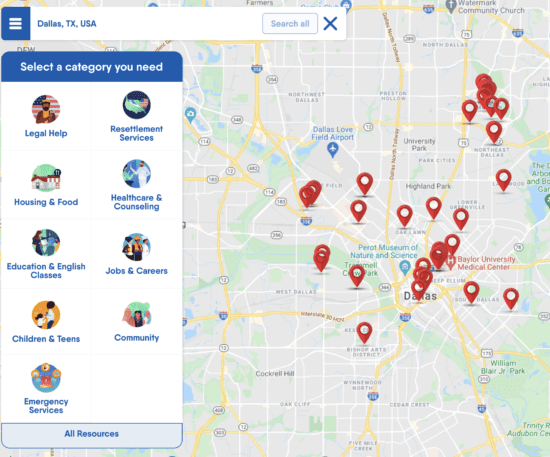
Jwenn èd legal, klas Anglè, klinik sante, sipò lojman, ak plis ankò. Chèche yon kat jeyografik lokal ak lis sèvis pou imigran nan Etazini a ak aplikasyon FindHello a.
Enfòmasyon ki nan paj sa a vini de USCIS, WomensLaw.org, ak lòt sous nou ka fè konfyans. Objektif nou se pou ofri enfòmasyon ki fasil pou konprann epi yo mete yo ajou regilyèman. Enfòmasyon sa yo pa konsèy jiridik.
